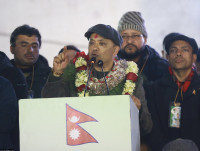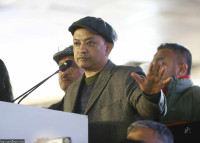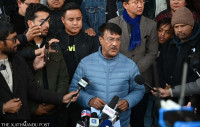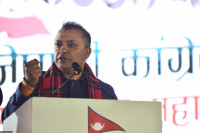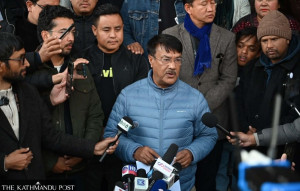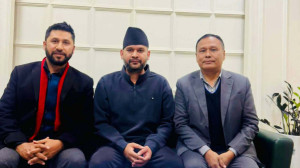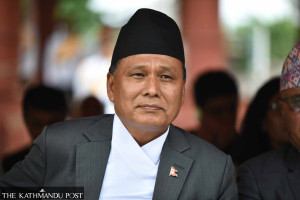Politics
Bankers fear Durga Prasai’s campaign could encourage mass defaults by borrowers
His drive demanding restoration of Hindu kingdom, abolition of federalism and protest against high lending rates hint at his political ambitions.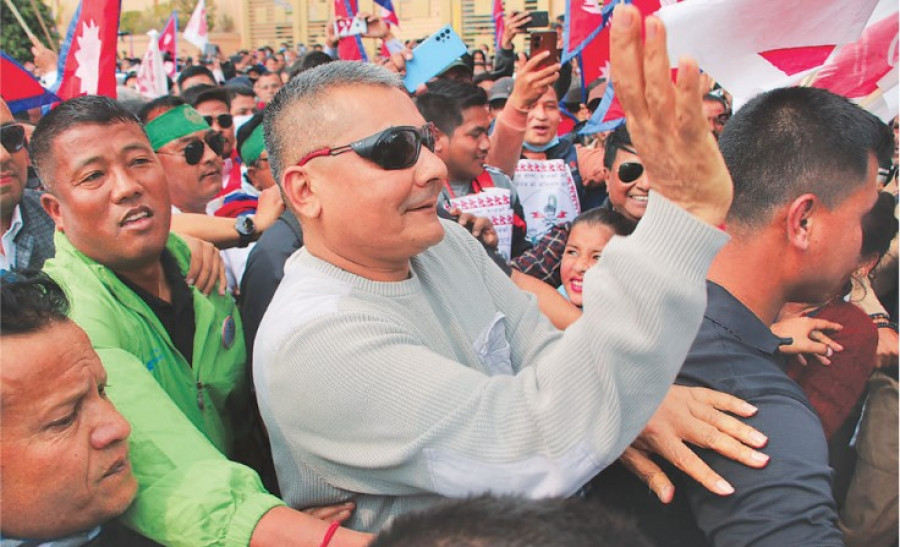
Prithvi Man Shrestha
Controversial businessman Durga Prasai is known for his strong linkage with the country’s top political leadership, including Prime Minister Pushpa Kamal Dahal and CPN-UML chair KP Sharma Oli.
Now, it appears, he has deserted these communist leaders as he is now seen running ‘a mega campaign to save the nation, nationality, religion, culture and citizens’. Restoration of monarchy, Hindu nation and abolition of federalism are major demands of the campaign.
Along with these major political demands, his campaign has also called for a waiver of loans up to Rs2 million, availability of loans at an interest rate of around six percent and restructuring of loans with a 15-year instalment period.
Prasai led a sizable rally in Kathmandu on March 4 after organising similar rallies in various districts, including Jhapa.
Central bank officials and bankers surmise that inclusion of the demands related to the banking sector was made a part of his efforts at a political ascent.
They said that the rise of Rabi Lamichhane as an influential leader in a short span of time after entering politics as the chairperson of the Rastriya Swatantra Party from a television host, might have inspired Prasai in his latest activities.
“My impression is that he has been raising the issues of the banking sector as a part of developing his own political career,” said an executive director of the Nepal Rastra Bank, the central bank.
Officials of the central bank and other banks expressed fears that his campaign could instigate some borrowers not to pay back their loans.
"If certain people are inspired by his campaign and default on their loans, they will have to suffer ultimately, because banks and financial institutions have the authority to recover the loans and most of the loans are heavily collateralised,” said the central bank official.
The NRB official said that people like Prasai could build their political career by instigating others not to pay back their loans, while those who follow people like him would eventually pay the price.
Even though he has been calling for a waiver of bank loans, he, himself, has been paying his instalments for the loans taken for B and C Medical College.
“I have paid instalments of the first and second quarters of the current fiscal year,” Prasai told the Post. “I cannot say whether I will be able to pay in the next quarter as the businesses are suffering at the moment.”
A consortium of banks including the Nabil Bank and the Global IME Bank had provided loans of more than Rs4 billion to Prasai to support his plan to convert the B and C Hospital into a medical college.
Prasai has been accused of trying to get approval for running a medical college based on his political connections, without the adequate infrastructure.
Until recently, he was a central committee member of the UML. Prasai got expelled last month by the party for running a pro-monarchy and anti-federalism campaign. Earlier, he was associated with the Maoist Centre.
“Prasai has not defaulted on our loans so far and loans provided to him have not been categorised as non-performing,” said Manoj Gyawali, deputy chief executive officer of the Nabil Bank.
As a consortium partner, Nabil had lent around Rs750 million to enable Prasai to establish a medical college. “Usually, default does not happen, if one bank’s loan has not been defaulted in consortium lending,” said Gyawali.
Though he has been repaying the loans, his campaign seeking loan waivers for others could instigate others to default on their loans. “Won’t other innocent borrowers face disaster for defaulting on their loans because of instigations by an ambitious person?” asked another central bank official.
A defaulter faces denial of many government services and they are also barred from holding public offices.
“Prasai’s campaign seems to be guided by gaining political mileage by highlighting the anomalies of the banking sector,” the central bank official said.
Similar is the impression on banker Sunil KC, chief executive officer of the NMB Bank. “I get the impression that he is seeking a political rise with such a campaign after seeing the success of other populist figures,” said KC, who is also the president of the Nepal Bankers' Association.
But Prasai, who has a sizeable social media following, claimed that he does not have any political ambitions even though he has been running a campaign, raising political and economic issues.
“I am not interested at all in joining politics. My priority is to do business and I just want a conducive environment to do business,” said Prasai.
He said that he had to speak against banks and financial institutions, cooperatives and the micro-finance institutions as they were charging high interest rates. “How can a person who initially had got loans at a certain interest rate, pay at a hiked rate, which is as high as 17 percent?” he asked. “Didn't you see the self-immolation of a person in front of the Parliament building because of business failure?”
In late January, Prem Prasad Acharya, 36, of Ilam district, set himself on fire in the middle of the road in front of the parliament building at New Baneshwar. He later died during the course of his treatment at Kirtipur Hospital in Kathmandu.
In recent weeks, borrowers of microfinance institutions (MFIs) are taking to the streets, accusing the MFIs of charging exorbitant interest rates which forced them to sell off their properties to pay back the loans.
Prasai said that he had talked about waiving loans taken from MFIs and cooperatives as they have already recovered five times what they had lent.
However, the central bank officials and bankers feel that Prasai’s campaign could influence small borrowers who have little financial literacy. Besides raising the issue of the flight of small borrowers, he also called for smearing soot on the chiefs and employees of banks and financial institutions.
Addressing a public rally in Jhapa two weeks ago, Prasai had called his supporters to resort to such tactics.
"There is nothing wrong with smearing those employees with black soot. The police will take us into custody and we can leave after four or five days," Prasai said while addressing the gathering. "We have even formed a group to smear black soot on the employees of financial institutions all over the country, under the leadership of Satish Pokhrel."
In late February, a micro-finance employee was smeared with black soot in Jajarkot in late February. On Wednesday, the Confederation of Banks and Financial Institutions Nepal, an agency of the bank promoters, said that the banking sector is terrified because of incidents of physical attacks on the staff of banks and financial institutions.
“The issue of high interest rates has also been blown out of proportion, while the banks and financial institutions are receiving threats of not being paid not only the interest but the principal amount as well,” the bankers’ body said.
After Prasai’s threat to blacken the faces of banking officials, the home ministry instructed the District Administration Offices and police to increase their vigil on banks and financial institutions, their branches, cooperatives and MFIs. “I had met with the home secretary and the Inspector General of Police and raised security concerns after Prasai’s threat,” said KC, president of the NBA.
Meanwhile, the police, on Wednesday, arrested a man in Chitwan allegedly associated with a campaign that warned of smearing soot on chiefs and employees of banks and financial institutions.
Inspector Subash Bhatta of Chitwan District Police Office said Shambhu Thapa, 42, of Bharatpur Metropolis-12 was arrested on Tuesday night. “Thapa was detained for investigation after he was found to be active in the campaign,” said Bhatta.
Prasai, however, said that his movement has already withdrawn the campaign of blackening the faces of the people associated with banks and financial institutions. “There is no such drive now,” he said.
Prasai has widened his support base by raising the issue of a Hindu nation and for the restoration of monarchy. “I am not interested in politics as of now, but will join politics, if I feel it necessary in the future,” he said.




 11.12°C Kathmandu
11.12°C Kathmandu

